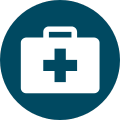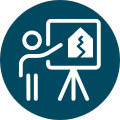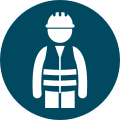
Our vision:
A safe and healthy Kitsap County for all.
Earthquakes
The Pacific Northwest is at a high risk for earthquakes.
Our region has several faults that can cause earthquakes. Earthquakes can damage buildings, utilities, roads, and bridges, causing injuries and disrupting daily life.
Be prepared and learn what to do before, during, and after an earthquake to protect yourself and your loved ones.

Click here to view current air quality if graphic does not load.
Checking Air Quality
For current air quality conditions in Kitsap County, go to:
For updates on wildfire activity and smoke forecasts, visit the Washington Smoke Information blog
Health Hazards
For information on how to stay safe and healthy during some of the most likely hazards we see or will likely experience in Kitsap County, check out the links below.
Visit the Kitsap County Department of Emergency Management website to learn more about local disaster preparedness and sign up for alerts. More resources are available at Ready.gov.
Be Prepared for an Earthquake
Make sure your emergency communication plan and supply kits are prepared before an earthquake strikes.
Perform a Home Hazard Hunt to identify any large appliances or furniture that might fall and anchor them into place.
Sign up for early warnings with ShakeAlert, which lets users know that a nearby earthquake could cause them to feel weak or greater shaking.
During an Earthquake
When the ground starts to shake, remember to “Drop, Cover, and Hold On.”
Drop – Get down on your hands and knees when you feel shaking. Stay away from windows and objects like bookcases that could fall. If you need to move to a safer location, stay low and crawl on your hands and knees.
Cover – Take cover under something sturdy, like a desk or a table. Cover your head and neck with one hand. If something solid like a hardcover book is nearby, use that to cover your head and neck.
Hold On – Hold in this position and grab on to your cover to prevent it from shaking away from you. Earthquakes may last from seconds to several minutes.
If you are indoors:
Stay inside, do not rush for an exit. Move away from windows and large objects and “drop, cover, and hold on.”
If you are outdoors:
Move to a clear area away from buildings, trees, electrical poles and wires, and other large objects.
If you are driving:
Slowly pull your vehicle to the side of the road and stop. Avoid bridges, overpasses, power lines, and other hazards. Stay inside the vehicle until shaking stops.
If you have a mobility disability:
If you are in a recliner or bed:
COVER your head and neck with your arms or a pillow until the shaking stops.
If you use a cane:
DROP, COVER, and HOLD ON
Or sit on a chair, bed, etc. and COVER your head and neck with both hands.
Keep your cane near you so it can be used when the shaking stops.
If you use a walker or wheelchair:
LOCK your wheels (if applicable).
If using a walker carefully get as low as possible.
Bend over and COVER your head/neck with your arms, a book, or a pillow.
Then HOLD ON until the shaking stops
Find more resources at Earthquake Country Alliance.
After an Earthquake
Check yourself and those around you for injuries.
Be prepared for aftershocks.
Stay away from downed power lines.
If you smell gas, open windows and shut off your main gas valve.
Reach out to your out-of-area contact.
Listen to a radio for emergency announcements.
Earthquakes may disrupt water and electricity services.
Tap water may be unavailable after an earthquake, make sure you know how to make water safe in an emergency.
Review how to keep food safe after an emergency when the power goes out.
Data: Air Quality & Asthma Visits to Kitsap Emergency Departments

Data: Heat Extremes in Kitsap County

Data: Precipitation in Kitsap County

Data: Temperature & Heat-related Visits to Emergency Departments

Data: Temperature and Cold-related Visits to Kitsap Emergency Departments









.png)
